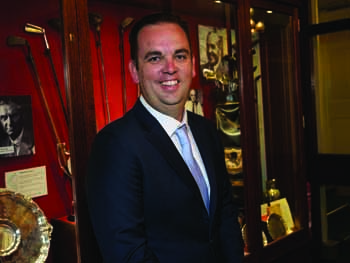In defence of golf club committees
You might expect that golf club manager Chris Duffy, who was made redundant at a private members’ club due to Covid-19, would argue that club committees and boards are bulwarks to the progress of the club. But, while acknowledging they’re not perfect, here he makes the case for his former board – stating they enhanced his role.

How many businesses in the UK that regularly turnover £1m a year or more are managed by volunteers?
Whatever type of private members’ club you are, whether it’s golf, it is highly likely that your club is managed through a volunteer committee, council or board of directors.
The key word here is ‘volunteer’ and that means no pay, no benefits, lots of stress and in many cases a lot of time – and time is the often the most precious commodity.
Having just been let go from a wonderful position at a historic golf club in Yorkshire, where in many ways I was left ‘hung out to dry’ by the board, some may expect this to turn into a bashing of club committees.
But to be honest, I really enjoyed my 18 months at the club, and my first experience of working with various sub-committees and the board of directors.
I see myself as a very personable individual. I love meeting with, talking with, working with, arguing with, laughing with and building relationships with bright, interesting people and the club board delivered on all these aspects!
Arriving at the club in January 2019, I was like a deer in the headlights, members wanting to talk, get to know me, what my aims and objectives were, and tell the good and the bad of the club.
The first 100 days I made a conscious decision to try and avoid working too much in the office. I would try to do most of the paperwork in the flat and spend as much time as possible around the clubhouse and course with members and staff. This included a lot of listening, sharing time in the members’ bar and restaurant, playing some golf, working with greenkeepers and understanding more about the staff, the members and their families.
There is always time for the office ‘stuff’, but I believe that building relationships is a key to understanding the soul of the club. I was open and honest with how I would approach the first 100 days and the board was fully supportive, which was fantastic.

I enjoyed conversations about club-related items, but I also loved unfocused ‘everything else’ conversations about travel and people, sports and books that the committees delivered. I loved creating reports, delivering research for club development and presentations to move the club forward, and the committees allowed me the opportunity and the motivation to do that.
The chairman suggested bringing the heads of departments to a selection of the board meetings. At first, I thought this was inappropriate, but after some reflection it was a great idea. My ego had got in the way – but who better knows the members, the club, the course than the staff who work in each department on a daily basis? The heads brought specific knowledge and were encouraged to engage in the conversations and ideas by the board. This increased exposure to the issues but also accelerated their growth and gave them a deepened understanding for the business.
One of my main objectives was to increase and retain members and find ways to connect them with other members. I do everything I can to get ‘newbies’ partnered with the sub-committee or board members, to get them engaged in the club experience, to let them see the ‘club journey’ from the inside.
It’s great to have long standing members serving on the committees, but they don’t always see the club in the way ‘new or younger generational’ members do – fresh eyes with fresh ideas is great, and getting these members engaged into the committees of the club will likely lead to more creative ideas, member engagement and loyalty.
Like people in any community, members love to ‘give back’ to their community. Covid-19 has brought about many wonderful stories of clubs or individuals giving back to their communities! Committees give members the opportunity to give back and people stay connected to their community when they’ve ‘given back’.
It’s often said that club managers could manage a Fortune 500 company. The various range of skills required from financial and marketing knowledge to food and beverage to agronomy awareness are unique. As general managers, we are required to become deep generalists rather than qualified specialists. Members want to listen and learn from ‘those who know’. Committees provide endless opportunities for general managers to teach and facilitate. Remember the committee may be made up of professionals in law, accounting, media to name a few occupations, but the manager is the paid professional in the room, so don’t be scared to raise your opinion as manager or listen as a board.

Committee meetings are a wonderful opportunity for generating ideas, critiquing ideas and testing ideas before ‘going public’ and turning sometimes flawed ideas into irreversible action. During my 18 months I floated various ideas in board meetings that I thought were brilliant. I’ve never been shy to try new ideas but on a number of occasions the board exposed the holes. The committee forum saved my embarrassment by sinking the idea before going public.
Committees are the loudspeaker for promoting and selling ideas to the club membership. Every committee member knows dozens of members and those dozens know dozens more. The ripple effect – if I want to let the club know something’s happening, I used the committees to get the news out.
I love to learn; I’ve never read more than over the past three years and committees are filled with people who know an awful lot about lots of things I know nothing about. Although I had only a short time with my club board I reflect on the various conversations about Brexit, politics, travel and more recently Covid-19. Committees are a think tank, a brain trust, a network of thinkers, so tap into their knowledge, it’s an all-expenses-paid education.
Club committees / boards provide a position for leadership. No better place to establish leadership skills than in a room filled with type ‘A’ personalities discussing where to go, which contractor to use, or how to get there.
A manager will ‘earn their leadership stripes’ one committee meeting at a time, showing they can analyse the issues, communicate their analysis, turn their analysis into action and grow from their mistakes. Leadership needs a ‘Platform with Purpose’ and committees are the place for the leader-manager to shine.
Committees are a tool that can be used to deliver ‘The Nudge’, to edge members in ‘The Right Direction’, to get decisions made that are needed!
It’s no secret that clubs very often say ‘things need to change’, but change is scary, it’s different and no-one wants to take the responsibility for change! If it doesn’t go to plan it will be on your board’s watch! Creating opportunities to nudge the members in the right direction is ideal.

An example from my club was it quickly became apparent that the food and beverage team didn’t enjoy the formal uniforms of white shirt, waist coat and tie, especially in the summer. So, we decided to change the uniforms for the ‘summer casual uniform’ to include a crested golf polo shirt. Offering the more traditional members’ feedback that ‘it was a summer uniform’ could be justified and satisfy their concerns, in the knowledge that the ‘summer uniform’ would become ‘standard’ after the summer and these members would move on to other concerns – we still used formal uniforms for private events and functions.
We have all had that club committee member who wants to speed off down the rails and create a halfway house or change a tee position or revise the dreaded ‘dress code’. Committees can be used to slow down the runaway train when ‘slow’ is wiser than ‘go’.
However, club committees can be a pain. I’ve heard many managers say:
“None of them know anything about clubs but they think they’re qualified to tell me, the educated professional, what needs doing.”
“We needed action now. They went around the table three times and got nothing done for four hours – and the opportunity was lost!”
“Committees are an enormous waste of time. Hours and hours of getting nowhere fast!”
“They toss out 30 ideas after the board meeting and expect me to do all of them right now.”
“I put all this work into preparing their ‘critical reports’ then the reports never got read.”
“They try to micromanage each department, and they don’t know anything.”
“They make the decisions, the decisions flop, then they blame the general manager when bad things happen!”
“They talk fancy about leadership, structure and strategic planning, use their pie-in-the-sky corporate talk to make decisions that don’t apply in the real world, to the small business issues we deal with every day in the trenches.”
“Committees are filled with the negatively inclined, those dour, sour and gloomy members who have nothing better to do than wallow in pessimism and suck the life out of the living, who crush the enthusiastic and only see ‘bad’ where others see ‘good’.”
Sure. Committees can be a pain in the neck. Sometimes – but not always.
Committees are time consuming, frequently frustrating and very often annoying but the good often outweighs the bad. My time with my club committee was cut short by a pandemic nobody could have foreseen and has changed the hospitality sector immeasurably.
The time that your club committees, boards or council members dedicate to the club is free of charge, they do it out of the love for the club and giving back to their community.

For those who first met me on the Club Managers Association of Europe MDP 1 in October 2016, they may remember I said there was no way I could see myself working in a private members’ club with sub-committees, boards and 600-plus managers.
Well, I may have changed my mind and even through a difficult final two months where I felt I was thrown ‘overboard’ by the board, I reflect back on the many positives and thank the board, and club members, for taking a risk by offering me the opportunity to serve as general manager of Huddersfield Golf Club, a wonderful 129-year old traditional members’ club in the heart of Yorkshire, England.
Chris Duffy is a board member of the Club Managers’ Association of Europe and the former general manager of Huddersfield Golf Club. Tel: 07706464782 or email chrisduffy1982@gmail.com















Can’t agree that all committee’s are good.
Our Captain wrote to members in March 2020 begging them to rejoin during Covid stating that members who rejoined would receive a credit in 2021.
In 2021 the committee decided to renage on this promise despite the club being in the black for the 1st time in years.
The club stated that any credits due would be put back into the clubs coffers and used towards improving the clubs facilities…..all well and good…. except those members who didn’t stand by the club and left, only to rejoin in 2021 are now in Line to benefit from my promised credit.
This is still ongoing as I have objected to their decision and reported them to Golf Ireland who have refused to get involved…. typical of a Governing Body that is self regulating!! and doesn’t want to punish one of its own.